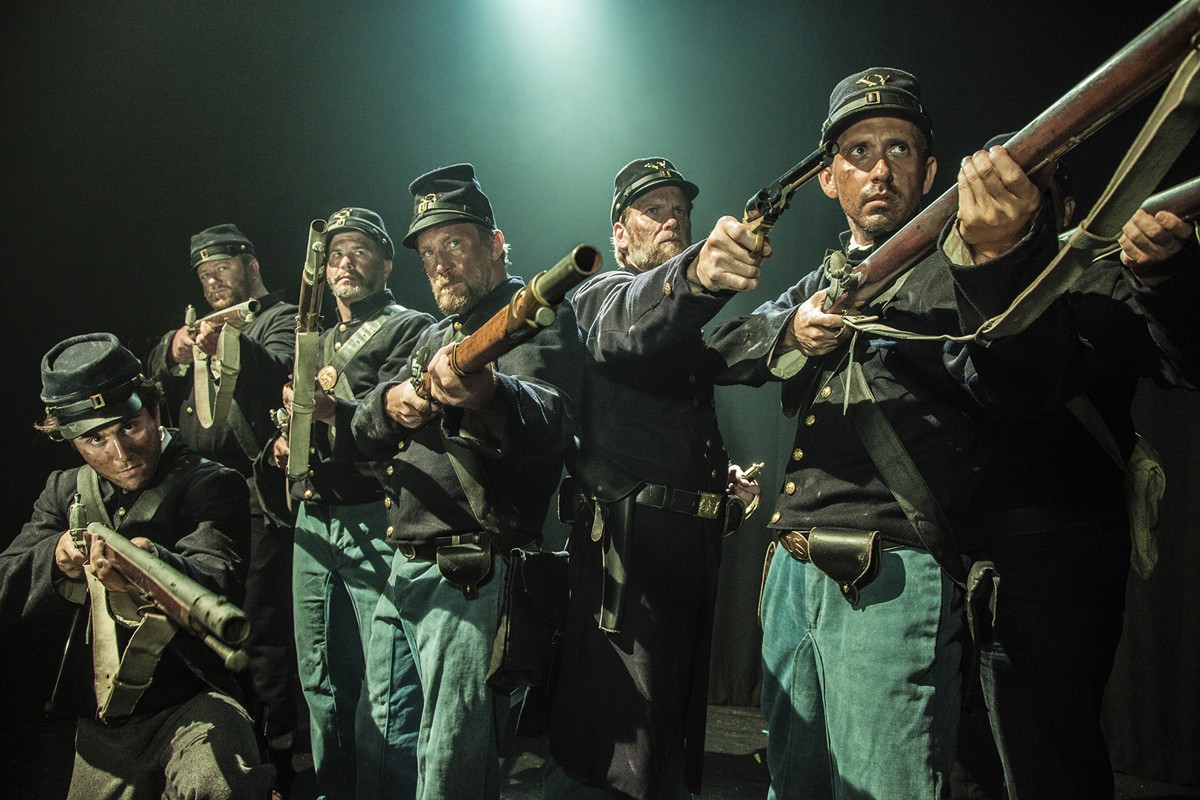
Though the American West played an enormous role in shaping the forces that would lead to the Civil War (as in, would that vast expanse of land between California and the Mississippi River be slave or free?), there are no battlefields, monuments or overt reverberations of that around these parts. Instead, one must go east, as Brian Newell did last summer, when he visited Gettysburg National Military Park in Pennsylvania.
Though it was the third time the Maverick Theater founder had visited Gettysburg, it was his first as an adult with a family of his own. And rather than just a simple drive-by or visiting the museum, he was determined to make a day of it by taking the guided ranger’s tour and immersing himself in the site.
Little did he know it would lead him to adapting one of the finest books ever written about Gettysburg and the War Between the States: Michael Shaara’s 1975 Pulitzer Prize-winning The Killer Angels.
“We were on a tour of Little Round Top, and the ranger was talking about some college professor who defended the end of the Union line and [ultimately decided] to do a bayonet charge down the mountain,” says Newell. “I was like, ‘What the hell are you talking about?’ I had heard nothing about that.”
Newell, who had developed a keen interest in the Civil War since watching Ken Burns’ landmark documentary (which was, in turn, inspired by Burns’ reading of Shaara’s novel, which was also the basis for the 1993 film Gettysburg), bought the book that day and started reading it, quickly realizing that “the dialogue was so well-done and the characters were so defined that it would be a fantastic play.”
That plunged him down a rabbit hole of researching the novel, battle and personalities involved, as well as contacting Shaara’s son, Jeffrey (the author died in 1988). Newell emailed the younger Shaara his concept and got a call back the next day, asking for more details. Shaara then drew up a contract and let Newell have the rights to adapt it. The contract was similar to one used with a director in Chicago, who had previously adapted the novel. While he offered to let Newell read that script, he declined. “I didn’t want to be influenced in any way,” he says. “I wanted to go on that gut instinct.”
In terms of staging, that gut instinct was to make the stage play as close to a film as possible. Throughout the Maverick’s history, Newell’s primary aesthetic has been what he calls “staged cinema,” either adapting movies to the stage or incorporating cinematic attributes into the staging. “My idea of staging cinema isn’t so much to take a screenplay and stage it,” Newell says. “It’s letting the characters tell the story with things like underscoring, cinematic lighting and cinematic quality of costuming. For instance, the uniforms we are using [purchased from a company that does Civil War re-enactments] are distressed, like something you’d see in a film, as if the characters have just come off the battlefield, and all the stressing work I took from websites on how [films] do it. So the feeling is like we’re on the set of a [motion] picture at times.”
Just as with the novel, Newell’s adaptation is written in a manner similar to Shakespeare’s history plays, in which battle scenes are not documented nearly as much as what characters are saying before and after. While the book and adaptation traverse all three bloody days of Gettysburg, there is only one battle scene included in Newell’s adaptation: Colonel Joshua Chamberlain’s heroic stand and bayonet charge on Little Round Top on the battle’s second day.
Instead of action, the emphasis is on the characters and their words, most of which are deeply rooted in fact. “[Michael Shaara] spent 10 years researching this. He studied their journals, diaries, letters—and you can hear that in his dialogue,” Newell says. “These characters and the details they share are extremely intense and realistic,” and rather than rely on hokey battle scenes and stage combat, Newell said his production is focused on the real people at its center.
Though inspired to stage the novel because of how well he thought it could work onstage, Newell has realized through the process that there are still lessons to learn from a 150-year-old conflict spawned in large part by a fundamental divide between opposing sides.
“Most important, what I want the audience walking away with is how this powerful struggle was an incredible reminder of how frail our system was as a new country—and how it fractured so simply,” Newell says. “And how none of us should take that system for granted.”
The Killer Angels at Maverick Theater, 110 E. Walnut, Fullerton, (714) 526-7070; www.mavericktheater.com. Fri.-Sat., 8 p.m.; Sun., 6 p.m. Through June 24. $10-$25.
Joel Beers has written about theater and other stuff for this infernal rag since its very first issue in, when was that again???

